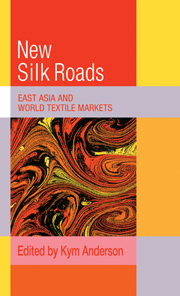Book contents
- Frontmatter
- Contents
- List of figures
- List of tables
- Contributors to this volume
- Preface
- Abbreviations and acronyms
- Symbols
- Introduction and summary
- I FIBRES, TEXTILES AND ECONOMIC DEVELOPMENT
- II DEMAND FOR TEXTILE EXPORTS FROM NEWLY INDUSTRIALIZING ASIA
- 5 The Multi-fibre Arrangement and China's growth prospects
- 6 International competition and Japan's domestic adjustments
- 7 The new silk road to Europe
- 8 The redirection of United States imports
- 9 Structural adjustments in Australia and New Zealand
- III CONCLUSIONS
- Appendix: Data on world production, consumption and trade in textiles, clothing and fibres
- Bibliography
- Index
5 - The Multi-fibre Arrangement and China's growth prospects
Published online by Cambridge University Press: 19 January 2010
- Frontmatter
- Contents
- List of figures
- List of tables
- Contributors to this volume
- Preface
- Abbreviations and acronyms
- Symbols
- Introduction and summary
- I FIBRES, TEXTILES AND ECONOMIC DEVELOPMENT
- II DEMAND FOR TEXTILE EXPORTS FROM NEWLY INDUSTRIALIZING ASIA
- 5 The Multi-fibre Arrangement and China's growth prospects
- 6 International competition and Japan's domestic adjustments
- 7 The new silk road to Europe
- 8 The redirection of United States imports
- 9 Structural adjustments in Australia and New Zealand
- III CONCLUSIONS
- Appendix: Data on world production, consumption and trade in textiles, clothing and fibres
- Bibliography
- Index
Summary
How important is the removal of trade restrictions against exports of textiles and clothing under the Arrangement Regarding International Trade in Textiles, commonly known as the Multi-fibre Arrangement (MFA), for China's future growth prospects? This chapter tries to answer this question by posing three further questions.
The first is whether a textile export growth phase comparable to those experienced by rapidly growing developing countries which have preceded China must inevitably form part of Chinese growth and, if so, what are the implications? The experience of Japan, Korea and Taiwan underlies the view, held strongly in some quarters, that a period of rapid growth in both production and exports of labourintensive manufactures such as textiles and clothing is an inevitable part of such a growth spurt. China's growth to date has been dominated by strong productivity performance in the agricultural sector (McMillan, Whalley and Zhu 1989), and only now is China beginning to move towards significant attempts at reform and growth in the manufacturing sector. How textiles and clothing exports fit into this picture, and what the potential is for China, are the issues.
The second major question is: how severely is the MFA an impediment to GDP and export growth for China, given that Hong Kong, Korea and Taiwan all seem to have achieved substantial growth in textile and clothing exports despite the MFA's presence? Unlike Taiwan and Korea, China may soon become large enough in both population and GDP terms for large increases in volumes of its textiles and clothing exports to cause major adjustments in importing countries.
- Type
- Chapter
- Information
- The New Silk RoadsEast Asia and World Textile Markets, pp. 70 - 88Publisher: Cambridge University PressPrint publication year: 1992

